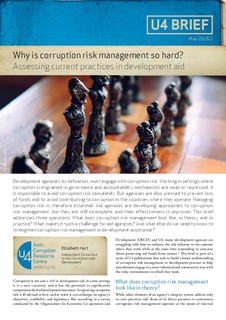Why is corruption risk management so hard? Assessing current practices in development aid
Report

Permanent lenke
http://hdl.handle.net/11250/2475212Utgivelsesdato
2016-05-01Metadata
Vis full innførselSamlinger
- Publications [1488]
Originalversjon
Bergen: Chr. Michelsen Institute (U4 Brief 2016:1) 4 p.Sammendrag
www.u4.no Development agencies, by definition, must engage with corruption risk. Working in settings where corruption is engrained in governance and accountability mechanisms are weak or repressed, it is impossible to avoid corruption risk completely. But agencies are also pressed to prevent loss of funds and to avoid contributing to corruption in the countries where they operate. Managing corruption risk is therefore essential. Aid agencies are developing approaches to corruption risk management, but they are still incomplete, and their effectiveness is unproven. This U4 Brief addresses three questions: What does corruption risk management look like, in theory and in practice? What makes it such a challenge for aid agencies? And what else do we need to know to strengthen corruption risk management in development assistance?
Utgiver
Chr. Michelsen InstituteSerie
U4 Brief 2016:1U4 Brief 2016:1
U4 Brief 2016:1
U4 Brief 2016:1